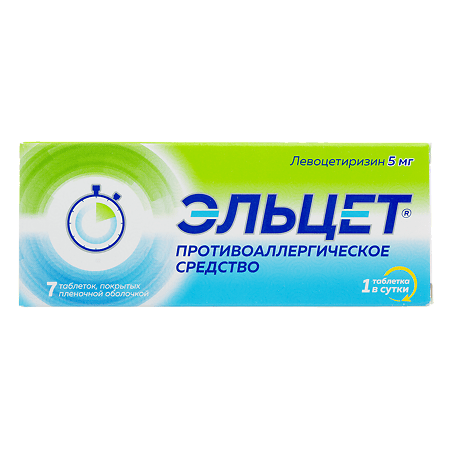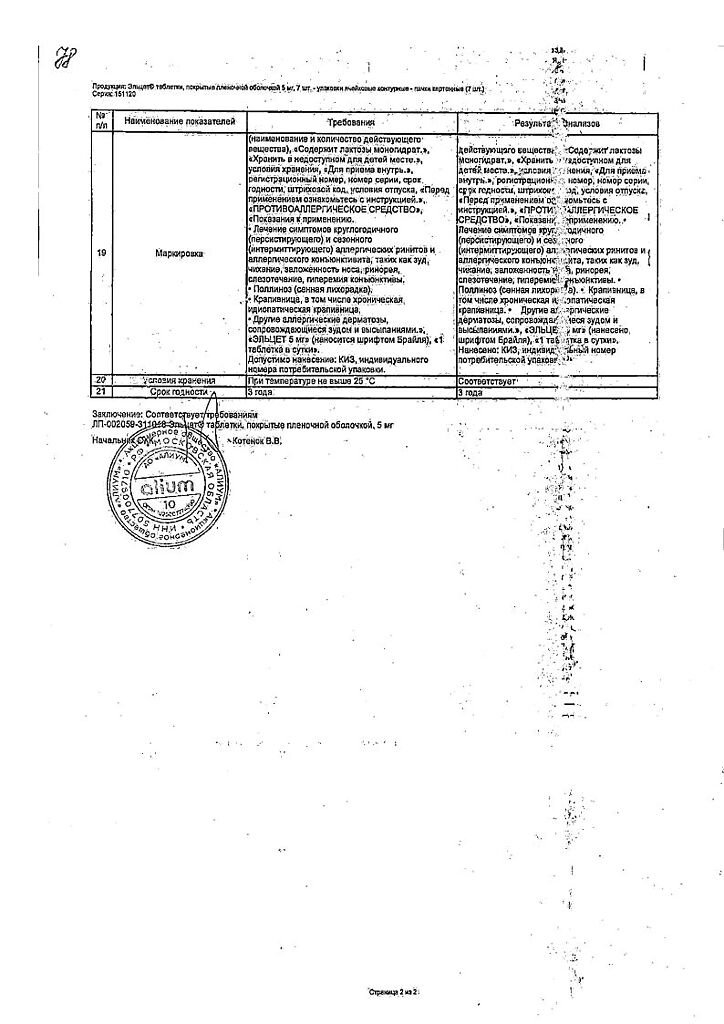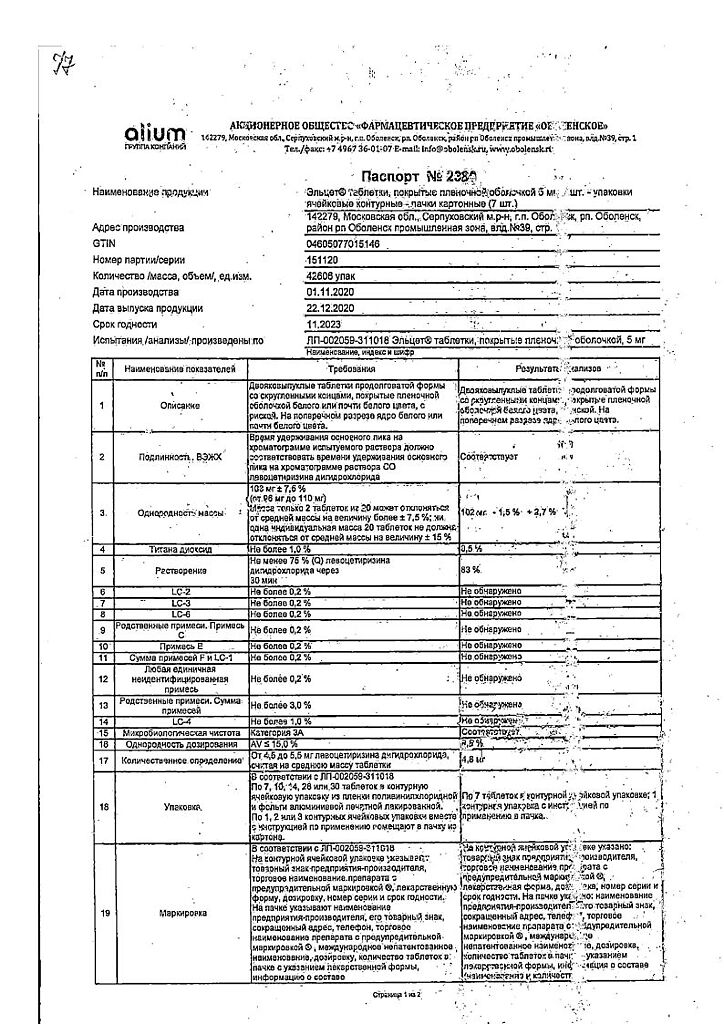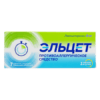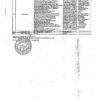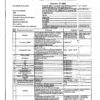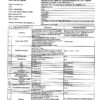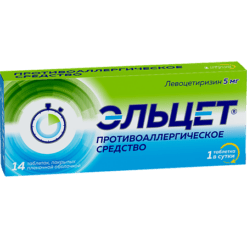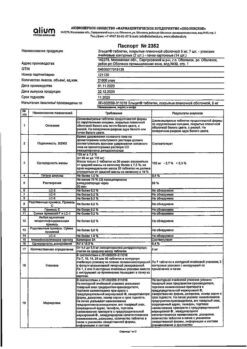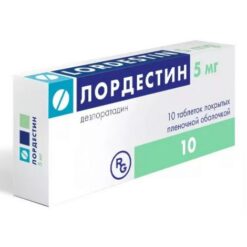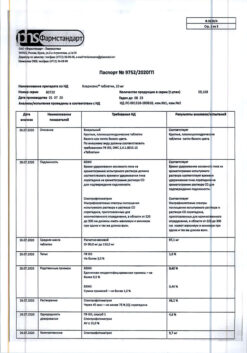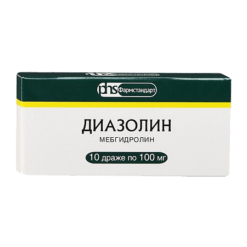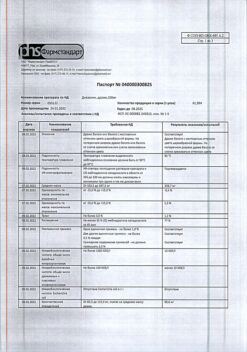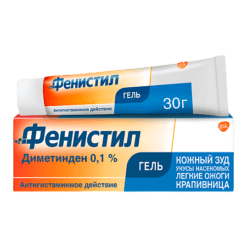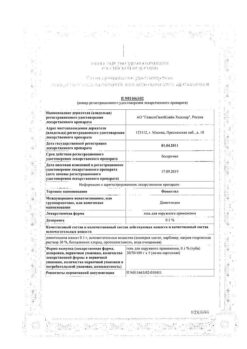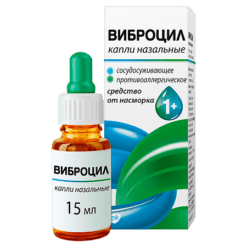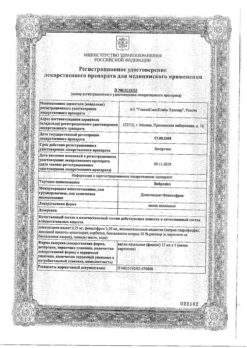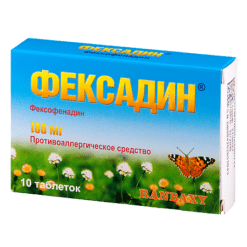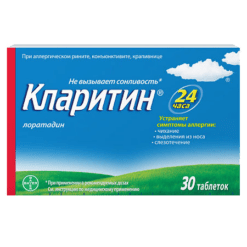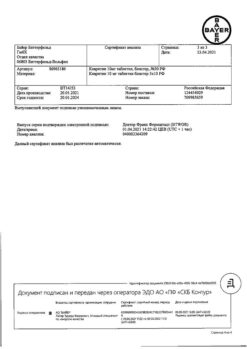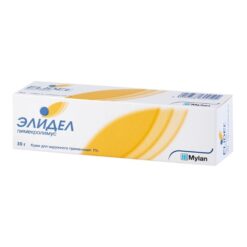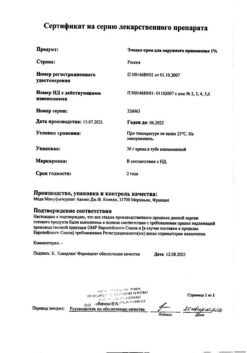No products in the cart.
Description
Pharmacotherapeutic group
H1-histamine receptor blocker (anti-allergic agent).
The ATX code: R06AE09
Pharmacological properties
Pharmacodynamics
Levocetirizine, the active ingredient of Elcet, is the R-enantiomer of cetirizine, a potent and selective histamine antagonist that blocks H]-histamine receptors.
Levocetirizine influences the histamine-dependent stage of allergic reactions and also reduces migration of eosinophils, decreases vascular permeability and limits the release of inflammatory mediators.
Levocetirizine prevents the development and facilitates allergic reactions, has antiexudative and antipruritic effects, it has practically no anticholinergic and antiserotonin action. In therapeutic doses it has practically no sedative effect.
Pharmacokinetics
The pharmacokinetic parameters of levocetirizine change linearly.
Eabsorption.
The drug is quickly and completely absorbed from the gastrointestinal tract after oral administration. Food intake does not affect the completeness of absorption, although it reduces its rate. The maximum concentration (Stah) in blood plasma is reached after 0.9 hour and is 270 ng/ml, the equilibrium concentration is reached after 2 days.
Distribution
Levocetirizine is 90% bound to plasma proteins. The volume of distribution (Vd) is 0.4 l/kg. Bioavailability reaches 100%.
Metabolism
In small amounts (< 14%) it is metabolized in the body by N- and O-dealkylation (unlike other H|-histamine receptor antagonists, which are metabolized in the liver by the cytochrome system) to form a pharmacologically inactive metabolite. Due to insignificant metabolism and lack of metabolic potential, interaction of levocetirizine with drugs seems unlikely.
The elimination half-life (Tx) in adults is 7.9 ± 1.9 hours. In young children the half-life is shorter. In adults, the total clearance is 0.63 ml/min/kg. About 85.4% of the drug dose taken is excreted unchanged by kidneys via glomerular filtration and tubular secretion; about 12.9% – via intestine. Certain groups of patients
Patients with renal failure
In patients with renal failure with creatinine clearance less than 40 ml/min, the drug clearance is decreased. In patients on hemodialysis total clearance is reduced by 80%. Less than 10% of the drug is removed during a standard 4-hour hemodialysis procedure.
Children
The data from a study of the pharmacokinetics of the drug in 14 children aged 6 to 11 years with a body weight between 20 and 40 kg when 5 mg of levocetirizine was taken orally once showed that the Stache and area under the curve (AUC) were about twice that of healthy adults in a cross-match control.
The mean Stache was 450 ng/mL, the maximum concentration was reached after an average of 1.2 hours, total clearance with body weight was 30% higher, and the elimination half-life was 24% shorter in children than in adults.
A retrospective pharmacokinetic analysis was performed in 324 patients (181 children aged 1 to 5 years, 18 children aged 6 to 11 years, and 124 adults aged 18 to 55 years) who received one or more doses of levocetirizine between 1.25 mg and 30 mg. The data obtained in the analysis showed that administration of the drug in a dose of 1.25 mg in children aged 6 months to 5 years resulted in plasma concentrations corresponding to those in adults when the drug was taken once daily.
Elderly patients
There are limited data on pharmacokinetics in elderly patients. When 30 mg of levocetirizine was repeatedly administered once daily for 6 days in 9 elderly patients (age 65 to 74 years), total clearance was approximately 33% lower than that of younger adults.
The distribution of cetirizine racemate has been shown to be more dependent on renal function than on age. This statement may also be applicable to levocetirizine, since both levocetirizine and cetirizine are primarily excreted with the urine. Therefore, in elderly patients, the dose of levocetirizine should be adjusted depending on renal function.
Indications
Indications
Symptoms of year-round and seasonal allergic rhinitis and allergic conjunctivitis, hay fever, urticaria, and other allergic dermatoses, accompanied by itching and rashes.
Pharmacological effect
Pharmacological effect
Pharmacotherapeutic group
H1-histamine receptor blocker (antiallergic agent).
ATX code: R06AE09
Pharmacological properties
Pharmacodynamics
Levocetirizine – the active substance of the drug Elcet – is the R-enantiomer of cetirizine, a powerful and selective histamine antagonist that blocks H]-histamine receptors.
Levocetirizine has an effect on the histamine-dependent stage of allergic reactions, and also reduces the migration of eosinophils, reduces vascular permeability, and limits the release of inflammatory mediators.
Levocetirizine prevents the development and facilitates the course of allergic reactions, has an antiexudative, antipruritic effect, and has virtually no anticholinergic and antiserotonin effects. In therapeutic doses it has virtually no sedative effect.
Pharmacokinetics
The pharmacokinetic parameters of levocetirizine change linearly.
Suction.
After oral administration, the drug is quickly and completely absorbed from the gastrointestinal tract. Eating does not affect the completeness of absorption, although it reduces its speed. The maximum concentration (Cmax) in the blood plasma is reached after 0.9 hours and is 270 ng/ml, the equilibrium concentration is reached after 2 days.
Distribution
Levocetirizine is 90% bound to plasma proteins. The volume of distribution (Vd) is 0.4 l/kg. Bioavailability reaches 100%.
Metabolism
In small quantities (<14%) it is metabolized in the body by N- and O-dealkylation (unlike other H|-histamine receptor antagonists, which are metabolized in the liver using the cytochrome system) to form a pharmacologically inactive metabolite. Due to its negligible metabolism and lack of metabolic potential, drug interactions between levocetirizine and drugs are unlikely.
Removal
The half-life (Tf) in adults is 7.9 ± 1.9 hours. In young children, the half-life is shorter. In adults, the total clearance is 0.63 ml/min/kg. About 85.4% of the administered dose of the drug is excreted unchanged by the kidneys through glomerular filtration and tubular secretion; about 12.9% – through the intestines. Selected patient groups
Patients with renal failure
In patients with renal failure with creatinine clearance less than 40 ml/min, drug clearance is reduced. In hemodialysis patients, total clearance is reduced by 80%. Less than 10% of the drug is removed during a standard 4-hour hemodialysis procedure.
Children
Data from a study of the pharmacokinetics of the drug in 14 children aged 6 to 11 years with a body weight of 20 to 40 kg with a single oral dose of 5 mg of levocetirizine showed that the Cmax and area under the curve (AUC) values are approximately two times higher than those in healthy adults during cross-control.
The mean Cmax was 450 ng/ml, the maximum concentration was reached after an average of 1.2 hours, the total body weight-adjusted clearance was 30% higher, and the half-life was 24% shorter in children than in adults.
A retrospective pharmacokinetic analysis was conducted in 324 patients (181 children aged 1 to 5 years, 18 children aged 6 to 11 years, and 124 adults aged 18 to 55 years) who received one or more doses of levocetirizine from 1.25 mg to 30 mg. Data obtained during the analysis showed that administration of the drug at a dose of 1.25 mg in children aged 6 months to 5 years leads to plasma concentrations similar to those in adults when taking the drug once a day.
Elderly patients
Pharmacokinetic data in elderly patients is limited. When repeated dosing of levocetirizine 30 mg once daily for 6 days in 9 elderly patients (ages 65 to 74 years) total clearance was approximately 33% lower than that in younger adults.
It has been shown that
the distribution of cetirizine racemate is more dependent on renal function than on
age. This statement may also apply to levocetirizine, as
how both drugs, levocetirizine and cetirizine, are eliminated primarily from
urine. Therefore, in elderly patients, the dose of levocetirizine should be
adjusted depending on kidney function.
Active ingredient
Active ingredient
Levocetirizine
Composition
Composition
1 tablet contains:
Active ingredient-
levocetirizine dihydrochloride – 5 mg;
Excipients
microcrystalline cellulose,
lactose monohydrate,
calcium hydrogen phosphate dihydrate,
sodium carboxymethyl starch (sodium starch glycolate),
povidone,
magnesium stearate;
Excipients for coating
hypromellose (hydroxypropylmethylcellulose), macrogol 6000 (polyethylene glycol 6000), titanium dioxide.
Contraindications
Contraindications
Hypersensitivity to the active substance, cetirizine, hydroxyzine, any piperazine derivative or any other excipient of the drug. Lactase deficiency, lactose intolerance, glucose-galactose malabsorption. End-stage renal failure (creatinine clearance <10 ml/min). Children under 6 years of age (due to limited data on safety and effectiveness).
With caution
In case of chronic renal failure (correction of the dosage regimen is necessary).
In elderly patients (with an age-related decrease in glomerular filtration).
In patients with spinal cord injury, prostatic hyperplasia, or in the presence of other factors predisposing to urinary retention, since levocetirizine may increase the risk of urinary retention.
When used simultaneously with alcohol (see Interactions with other drugs).
When prescribed to pregnant women and during breastfeeding
feeding.
Side Effects
Side Effects
Elcet is usually well tolerated by patients; in some cases, patients have experienced the following side effects:
From the gastrointestinal tract and liver: dry mouth, nausea, vomiting, pain in the epigastric region, hepatitis. Changes in liver test parameters are also possible.
From the central and peripheral nervous system: headache, dizziness, disturbance of sleep and wakefulness, increased fatigue, weakness.
Allergic reactions: skin rash, itching, urticaria, anaphylactic shock, Quincke’s edema.
Others: palpitations, decreased visual acuity, shortness of breath, weight gain, muscle pain.
If side effects develop, you should stop taking the drug and contact your doctor.
Interaction
Interaction
When Elcet is used in combination with theophylline, an increase in the half-life of levocetirizine is observed.
The drug, when used simultaneously with ketoconazole and antimicrobial agents of the macrolide group, does not lead to ECG changes.
When levocetirizine is used in combination with drugs that depress the central nervous system and ethanol, drowsiness may develop.
Overdose
Overdose
When using excessive doses of Elcet, patients experience the development of nausea, vomiting, dry mouth, gastralgia, headache and drowsiness.
There is no specific antidote. In case of overdose, gastric lavage, intake of enterosorbents and symptomatic therapy are indicated. Hemodialysis in case of an overdose of levocetirizine is ineffective.
Manufacturer
Manufacturer
Alium JSC, Russia
Additional information
| Manufacturer | Alium JSC, Russia |
|---|---|
| Medication form | pills |
| Brand | Alium JSC |
Other forms…
Related products
Buy Elcet, 5 mg 7 pcs. with delivery to USA, UK, Europe and over 120 other countries.

